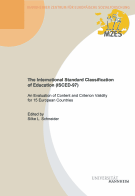|
Go to |
Abstract
The availability and validity of cross-nationally comparable measures of education-related concepts, especially educational attainment, are an important condition of international statistical reporting on education as well as cross-national social research. The International Standard Classification of Education (ISCED-97) is a cross-national classification framework for harmonising educational programmes and qualifications, the first version of which was developed by the UNESCO in the 1970s. It has been extensively used for international statistical reporting e.g. by the OECD and increasingly also for measuring educational attainment in cross-national surveys, e.g. the European Union Labour Force Survey (EU-LFS), the Programme for International Student Assessment (PISA) and the European Social Survey (ESS). Nevertheless, to date it has not yet been thoroughly evaluated.
In this book, country experts from all parts of Europe evaluate the application of the ISCED-97 to national educational qualifications in 15 European countries: the Netherlands, Germany, France, Spain, Italy, Slovenia, Bulgaria, Hungary, the Czech Republic, Poland, Estonia, Finland, Sweden, the UK and Ireland. An introductory chapter introduces the ISCED-97 in some detail and synthesizes the results from the country chapters. Each country chapter starts out with a description of the respective country's educational system, including the most important past reforms. Then, the OECD's and Eurostat's assignment of ISCED categories to country-specific educational qualifications is described and evaluated. The authors finally validate the distribution of educational attainment as measured by the ISCED-97 found in the EU-LFS with distributions they individually derive from national education variables in national (usually labour force) surveys.
With respect to the reproducibility of the ISCED distributions found in the EU-LFS by recoding "indigenous" education variables in national data sets, the results are positive overall, but with some exceptions. The core problems in the application of the ISCED-97 lie elsewhere. They can be divided into three areas: 1) conceptual limitations of the ISCED-97 itself, 2) difficulties in the application of the ISCED to actual educational qualifications in the countries, and 3) constricted implementation in cross-national surveys.
The final chapter puts forward some suggestions on how progress in the measurement of educational attainment for cross-national research could be made. The suggestions involve 1) the refinement of the ISCED-97 in a future revision, 2) the enhancement of nationally specific measures of educational attainment, and 3) the amelioration of coding procedures in cross-national surveys.
The book presents the results of more than two years of cross-national collaboration in the EDUC research team "Evaluation of the ISCED-97 for Comparative Research" of the EQUALSOC network (www.equalsoc.org).
Notes on Contributors
Acknowledgement
Foreword
Walter Müller
The International Standard Classification of Education 1997: challenges in the application
to national data and the implementation in cross-national surveys
Silke L. Schneider and
Irena Kogan pdf
The educational system of the Netherlands
Ruud Luijkx and Manon de Heus pdf
Applying the ISCED-97 to the German educational qualifications
Silke L. Schneider pdf
Applying the ISCED-97 to France: some issues and propositions
Annick Kieffer pdf
Evaluation of the ISCED-97 for the Spanish system of education
Luis Ortiz pdf
The application of the ISCED-97 to Italy
Carlo Barone and Antonio Schizzerotto
pdf
The Bulgarian educational system and evaluation of the ISCED-97 implementation
Dobrinka Kostova pdf
International comparability of the outcomes of the Slovenian education system –
national vs international classification of education
Angela
Ivanèiè pdf
The Hungarian educational system and the implementation of the ISCED-97
Erzsébet Bukodi, Péter Róbert and Szilvia Altorjai pdf
The Czech educational system and evaluation of the ISCED-97 implementation
Jana
Straková pdf
The ISCED-97 in the Polish context
Bogdan W Mach and Maciej D Kryszczuk pdf
The Estonian educational system and the ISCED-97
Ellu Saar pdf
The Swedish educational system and classifying education using the ISCED-97
Karin
Halldén pdf
Education in Finland and the ISCED-97
Elina Kilpi pdf
The application of the ISCED-97 to the UK’s educational qualifications
Silke L.
Schneider pdf
The Irish educational system: a note on classification
Emer Smyth pdf
Suggestions for the cross-national measurement of educational attainment: refining
the ISCED-97 and improving data collection and coding procedures
Silke L. Schneider pdf
